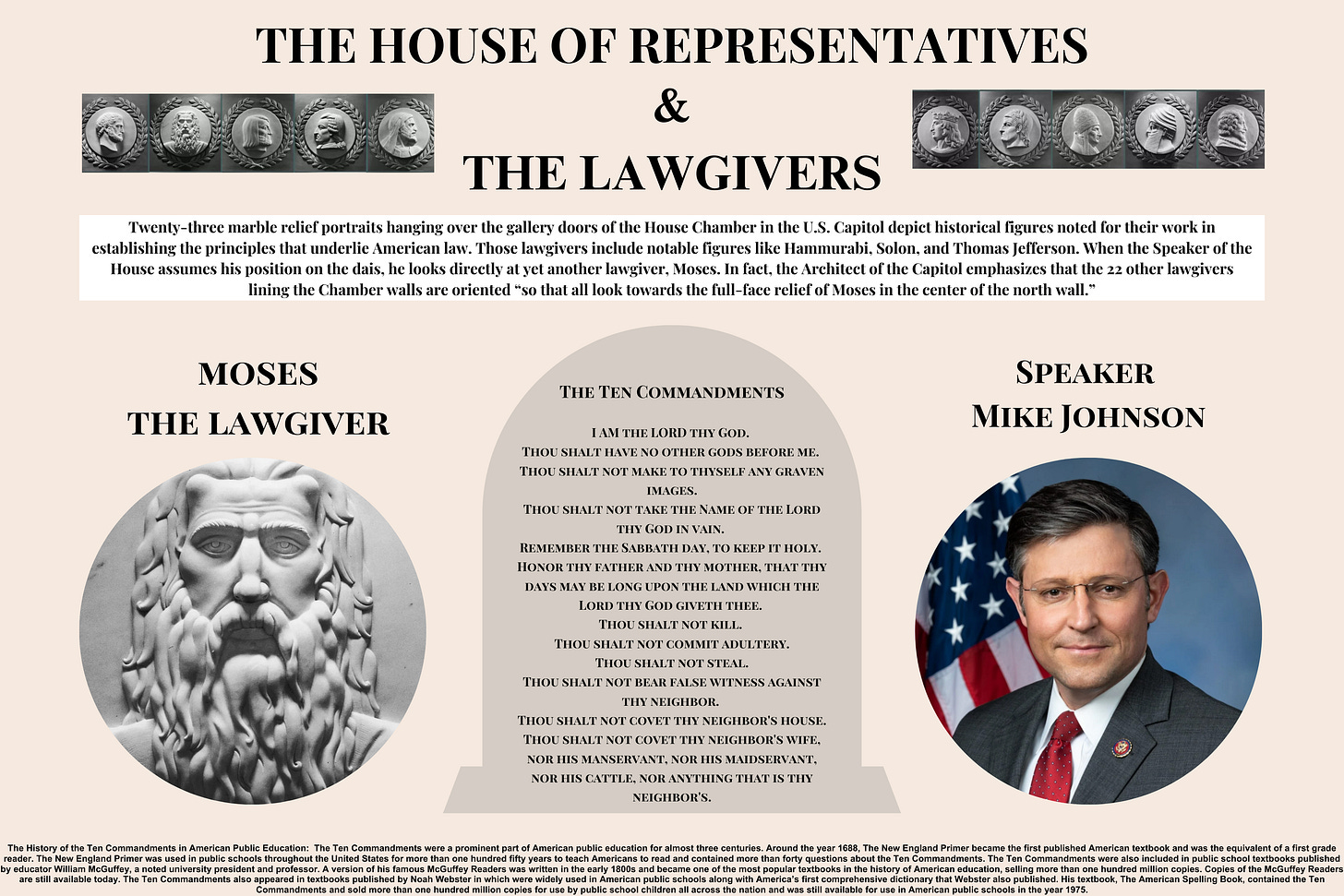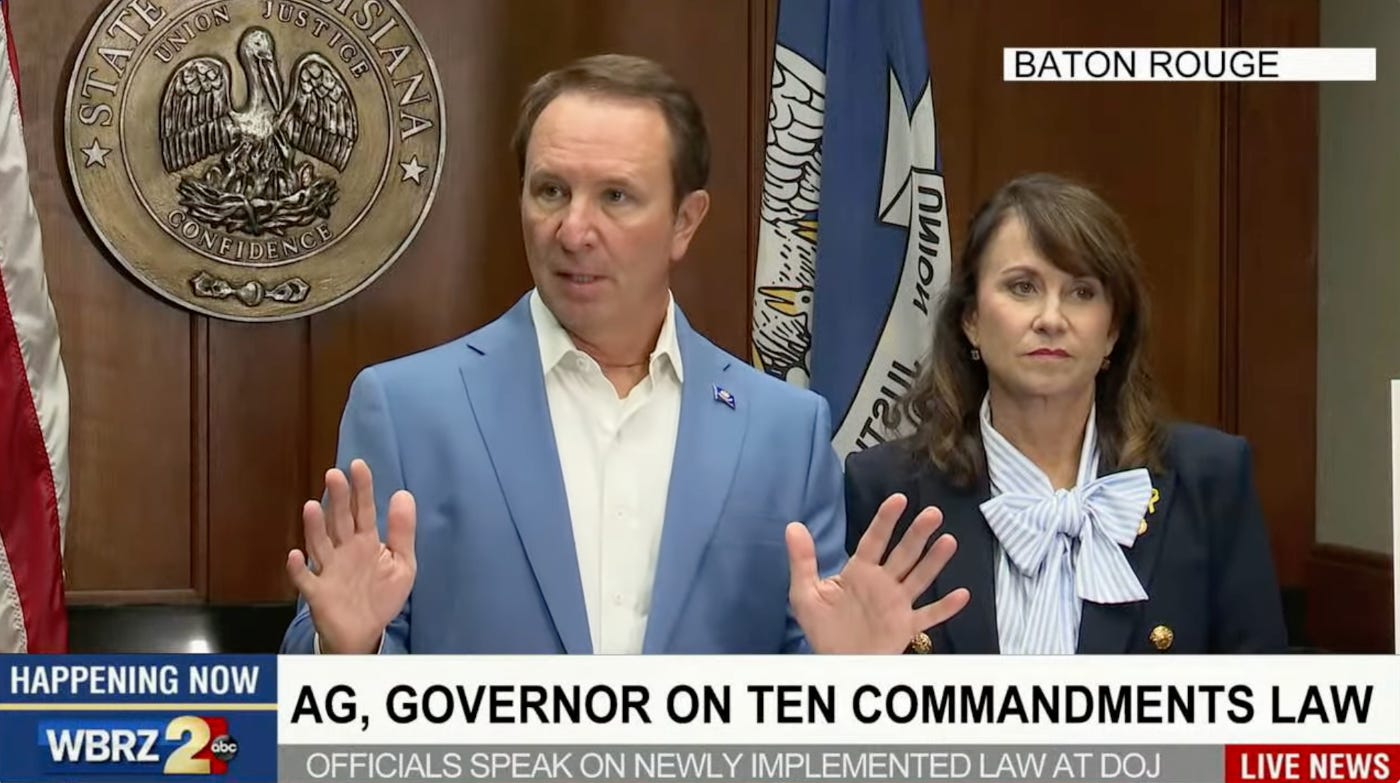Louisiana found the worst ways to defend its Ten Commandments in classrooms law
These posters are an embarrassment
This newsletter is free, but it’s only able to sustain itself due to the support I receive from a small percentage of regular readers. Would you please consider becoming one of those supporters? You can use the button below to subscribe to Substack or use my usual Patreon page!
On Monday morning, Louisiana’s Republican Gov. Jeff Landry and Attorney General Liz Murrill held a press conference to announce their plans to ask a federal judge to dismiss a lawsuit meant to block the law requiring public schools to post a copy of the Ten Commandments in every classroom. (Got all that?)
To put that in simpler terms, they still want to shove Christianity into every classroom, and no lawsuit is going to get in their way.
You may recall that Landry signed a law back in June, saying in a speech that he "can't wait to be sued." And then the state was sued by a coalition of religious and non-religious plaintiffs backed by several groups that fight for church/state separation. (I explained the specifics of their lawsuit here.)
Those groups said that HB 71 “substantially interferes with and burdens” their clients’ First Amendment freedoms. By mandating the KJV Ten Commandments be displayed in every classroom, the state was effectively telling kids which religion counts—and which ones don’t. The practical consequence of that message was to teach kids from non-KJV families that they were second-class citizens.
None of that mattered to Landry or Murrill on Monday morning.
They said they were asking U.S. District Judge John deGravelles (an Obama-appointed judge) to toss out the lawsuit because the plaintiffs had no standing. After all, they explained, the law didn’t go into effect until January 1, and none of the posters had even gone up in classrooms yet, so what the hell was everyone complaining about?
"The Plaintiffs cannot prove that they have any actual injury. That's because they don't allege to have seen any displays yet, and they certainly can't allege that they have seen any display of the Ten Commandments that violates their constitutional rights," Murrill said.
…
Governor Jeff Landry joined Murrill to reaffirm his support for the legislation. He also responded to the nationwide criticism the law received.
"I did not know that the Ten Commandments was such a bad way for someone to live their life," Landry said. "I believe that the legislature was only following the will of the people of the state because when you look at the sheer votes that were cast in support of this bill, it was done with bipartisan support."
It’s bizarre for Landry to claim the bill was bipartisan in a state with a Republican supermajority. While some conservative Democrats voted in favor of the bill, all the no votes came from other Democrats.
More to the point, though, the First Amendment isn’t subject to popular vote. That’s why it’s a right. Even if 100% of legislators supported the bill, it would still be illegal.
This law is illegal because posting a Christian display in public school classrooms, no matter what it looks like and no matter how much Republicans try to twist it to pretend it’s relevant to American history, is a violation of the First Amendment. No amount of window dressing will change that.
When Landry was asked what he would say to atheist students or their parents upset at seeing the Christian Commandments in the classroom, he reiterated his belief that none of those people matter:
I think we've forgotten in this country that democracy actually means majority rules... When you elect people, you elect them by a majority. That majority gets to rule. That does not mean that, if you don't like something, you have a right to… impose that which the majority likes. And so what I would say to those parents is… if those posters in school, they find them so [unintelligible], tell the child not to look at it!
That’s the sort of response you only ever hear from Christians who expect their religion to be treated as the default. It’s apparently everyone else’s job to ignore the Christian propaganda, not the government’s responsibility to avoid promoting a favored religion. And no, democracy doesn’t mean the majority gets to trample over the minority’s rights.
But the star of the press conference was Murrill, who displayed example after example of posters that couldn’t possibly offend anyone. (The same images also appeared in the 60-page brief they filed with the judge.)
I don’t think she was expecting anyone to read the posters carefully, though, because if they had, they would have noticed a number of problems with them.
This poster suggests the Supreme Court endorses the Ten Commandments as a pillar of American law, but just look at the quotations! For example, there’s one that says “this Court has subscribed to the view that the Ten Commandments influenced the development of Western legal thought.”
That’s from Justice John Paul Stevens’ dissent in Van Order v. Perry in which he actually says the following:
Though this Court has subscribed to the view that the Ten Commandments influenced the development of Western legal thought, it has not officially endorsed the far more specific claim that the Ten Commandments played a significant role in the development of our Nation’s foundational documents.
So… that statement goes against Louisiana’s law.
The other dissent on the poster comes from former Justice David Souter, who specifically said the Ten Commandments would be okay to display in public spaces “so long as there is a context and that context is historical.” But Louisiana’s law doesn’t require classrooms to post that context.
The poster is a giant self-own.
Just like this one with a picture of Ruth Bader Ginsburg:
That statement suggests the Ten Commandments is one of the world’s “four great documents,” a line the lawsuit says RBG “wrote in [her book] My Own Words.”
You might wonder: Why would RBG write something like that in the final years of her life? It doesn’t sound like her.
And if you wondered that, you would be right. She didn’t write those words in the present day. She wrote them in 8th grade. She just reprinted that old essay in the book:
Murrill is literally quoting RBG’s opinion when she was barely a teenager. She doesn’t want to quote anything RBG wrote as a sitting justice because it would undoubtedly go against Louisiana’s theocratic law.
Then there’s this cringe-worthy poster:
Don’t use Lin-Manuel Miranda to justify your unconstitutional law.
It’s not even a good parallel! The song from “Hamilton” has nothing to do with the biblical Ten Commandments. It’s just a list of ten things that are metaphorically referred to as the “commandments”! Calling them that doesn’t support the bullshit Louisiana law any more than David Letterman’s Top Ten Lists did.
Murrill did the same thing with Martin Luther King, Jr., citing his list of rules for non-violence as if it justifies putting the Ten Commandments on the classroom walls. But even MLK’s list is another explicitly religious—and explicitly Christian—one that has no place in a public school. There’s no reason anyone needs to meditate on the life of Jesus or pray “to be used by God.”
Finally, because this is Louisiana, Murrill had one last poster with a giant picture of House Speaker (and Christian Nationalist) Mike Johnson. Next to Moses. Because they’re both famous lawgivers. (Even though Johnson is arguably one of the worst speakers ever, presiding over one of the least productive sessions of Congress.)
By that logic, they might as well put up a picture of Marjorie Taylor Greene. Why the hell not?
In short, all of these sample posters are testaments to why this law is utterly idiotic.
For now, Judge deGravelles has already said no schools may put up the Commandments until at least November 15, giving him time to consider the merits of the lawsuit.
No matter what he eventually says, though, this case will be appealed, likely all the way to the Supreme Court. When that happens, it won’t matter that an identical law in Kentucky was deemed unconstitutional 44 years ago in Stone v. Graham. It won’t matter that the 2005 Supreme Court case of Van Order v. Perry said that a Ten Commandments monument on government property was only permissible in context, like as part of a broader set of displays dealing with laws throughout history.
If we learned anything from the press conference, it’s that the state AG’s office is full of people who should never have graduated from law school and that the Republicans running Louisiana should have no problem with malicious compliance. If people want to donate Ten Commandments posters that mock, criticize, or dismiss Christianity, it should be fair game.
I mean, if an 8th grader’s essay works for the attorney general, then a Ten Commandments poster with a pentagram in the background should be welcome too.
That said, it’d be even better if the law was just declared unconstitutional and this whole charade was put to rest.
(Portions of this article were published earlier)








I would refer those people opposing the posting of the Ten Commandments in classrooms to the King James Version of the Constitution, specifically the section outlining the divine right of Republicans. /S
There was a time when Americans could rely upon the federal court system and the Supreme Court to protect freedoms, but no more. All that has been tossed out the window in the name of conservatism, and judges who never gave up on feudalism.
It tells a lot about Landry. He thinks that the ten commandments are so boring, uninteresting and trivial that all one has to do to ignore them is to look away. And yet, a book with a gay character is so interesting and alluring, that the only way to prevent a child from looking at the book, it to physically remove it. That if a child had physical access to such a book, they would be drawn to it like a nail to a magnet, and the power of such a book would change that child's life in important and dramatic ways. But the ten commandments are so weak and trivial, that as soon as you look away, they disappear like a fart in the wind.